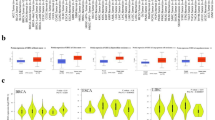Abstract
Colorectal cancer (CRC) is one of the leading causes of cancer-related deaths worldwide. GGN is a germ cell-specific gene, but its function in CRC has been rarely reported to date. The aim of this study was to investigate the potential role of GGN in CRC tumorigenesis. Therefore, in this study, we examined the expression of GGN in CRC cell lines and tissues and its effects on cellular proliferation and apoptosis. We then explored the underlying mechanism. Our results showed that GGN was significantly overexpressed in both CRC cell lines and tissues. Silencing GGN robustly inhibited proliferation of CRC cells, and it also promoted apoptosis of CRC cells. Moreover, knockdown of GGN inhibited the expression of p-Akt in CRC cells. Taken together, these results showed that knockdown of GGN inhibits proliferation and promotes apoptosis of CRC cells through the PI3K/Akt signaling pathway. Our findings revealed for the first time a potential oncogenic role for GGN in CRC progress. This finding may provide a unique perspective on how a germ cell-specific gene might serve as a biomarker, or even as a therapeutic target, for CRC.




Similar content being viewed by others
References
Siegel RL, Miller KD, Jemal A (2018) Cancer statistics, 2018. CA Cancer J Clin 68:7–30
Chen W, Zheng R, Baade PD et al (2016) Cancer statistics in China, 2015. CA Cancer J Clin 66:115–132
Kuipers EJ, Grady WM, Lieberman D et al (2015) Colorectal cancer. Nat Rev Dis Primers 1:15065
Fakih MG (2015) Metastatic colorectal cancer: current state and future directions. J Clin Oncol 33:1809–1824
Brenner H, Kloor M, Pox CP (2014) Colorectal cancer. Lancet 383:1490–1502
Colussi D, Brandi G, Bazzoli F, Ricciardiello L (2013) Molecular pathways involved in colorectal cancer: implications for disease behavior and prevention. Int J Mol Sci 14:16365–16385
Johnston PG (2014) Identification of clinically relevant molecular subtypes in colorectal cancer: the dawning of a new era. Oncologist 19:568–573
Lu B, Bishop CE (2003) Mouse GGN1 and GGN3, two germ cell-specific proteins from the single gene GGN, interact with mouse POG and play a role in spermatogenesis. J Biol Chem 278:16289–16296
Jamsai D, Sarraj MA, Merriner DJ, Drummond AE, Jones KT, McLachlan RI, O’Bryan MK (2011) GGN1 in the testis and ovary and its variance within the Australian fertile and infertile male population. Int J Androl 34:624–632
Wang W, Li C, Chen Y, Teng L, Cao Y, Xu Y, Pan H, An R (2018) Increased expression of GGN promotes tumorigenesis in bladder cancer and is correlated with poor prognosis. Gene 652:7–15
Lan ZJ, Hu Y, Zhang S, Li X, Zhou H, Ding J, Klinge CM, Radde BN, Cooney AJ, Zhang J, Lei Z (2016) GGNBP2 acts as a tumor suppressor by inhibiting estrogen receptor α activity in breast cancer cells. Breast Cancer Res Treat 158:263–276
Yin F, Liu L, Liu X et al (2014) Downregulation of tumor suppressor gene ribonuclease T2 and gametogenetin binding protein 2 is associated with drug resistance in ovarian cancer. Oncol Rep 32:362–372
Tariq K, Ghias K (2016) Colorectal cancer carcinogenesis: a review of mechanisms. Cancer Biol Med 13:120–135
Okugawa Y, Grady WM, Goel A (2015) Epigenetic alterations in colorectal Cancer: emerging biomarkers. Gastroenterology 149:1204–1225.e12
Chen A, Li J, Song L, Ji C, Böing M, Chen J, Brand-Saberi B (2017) GGNBP2 is necessary for testis morphology and sperm development. Sci Rep 7:2998
Zhao Q, Zhou Y, Cao Z, Zhu H, Huang P, Lu B (2005) Germ-cell specific protein gametogenetin protein 2 (GGN2), expression in the testis, and association with intracellular membrane. Mol Reprod Dev 72:31–39
Stoian M, State N, Stoica V, Radulian G (2014) Apoptosis in colorectal cancer. J Med Life 7:160–164
Galluzzi L, López-Soto A, Kumar S, Kroemer G (2016) Caspases connect cell-death signaling to organismal homeostasis. Immunity 44:221–231
Malinowsky K, Nitsche U, Janssen KP, Bader FG, Späth C, Drecoll E, Keller G, Höfler H, Slotta-Huspenina J, Becker KF (2014) Activation of the PI3K/AKT pathway correlates with prognosis in stage II colon cancer. Br J Cancer 110:2081–2089
Danielsen SA, Eide PW, Nesbakken A et al (2015) Portrait of the PI3K/AKT pathway in colorectal cancer. Biochim Biophys Acta 1855:104–121
Acknowledgments
This study was supported by the Beijing Municipal Science & Technology Commission (No. Z161100000116090); the National Key Research and Development Program of the Ministry of Science and Technology of China (No. 2016YFC0905303); the CAMS Innovation Fund for Medical Sciences (CIFMS) (No.2016-I2M-1-001); and the Beijing Science and Technology Program (No. D17110002617004).
Author information
Authors and Affiliations
Corresponding author
Ethics declarations
Conflict of Interest
The authors declare that they have no conflict of interest.
Additional information
Publisher’s Note
Springer Nature remains neutral with regard to jurisdictional claims in published maps and institutional affiliations.
Rights and permissions
About this article
Cite this article
Liu, Z., Yang, M., Wang, S. et al. GGN Promotes Tumorigenesis by Regulating Proliferation and Apoptosis in Colorectal Cancer. Pathol. Oncol. Res. 25, 1621–1626 (2019). https://doi.org/10.1007/s12253-019-00595-3
Received:
Accepted:
Published:
Issue Date:
DOI: https://doi.org/10.1007/s12253-019-00595-3




